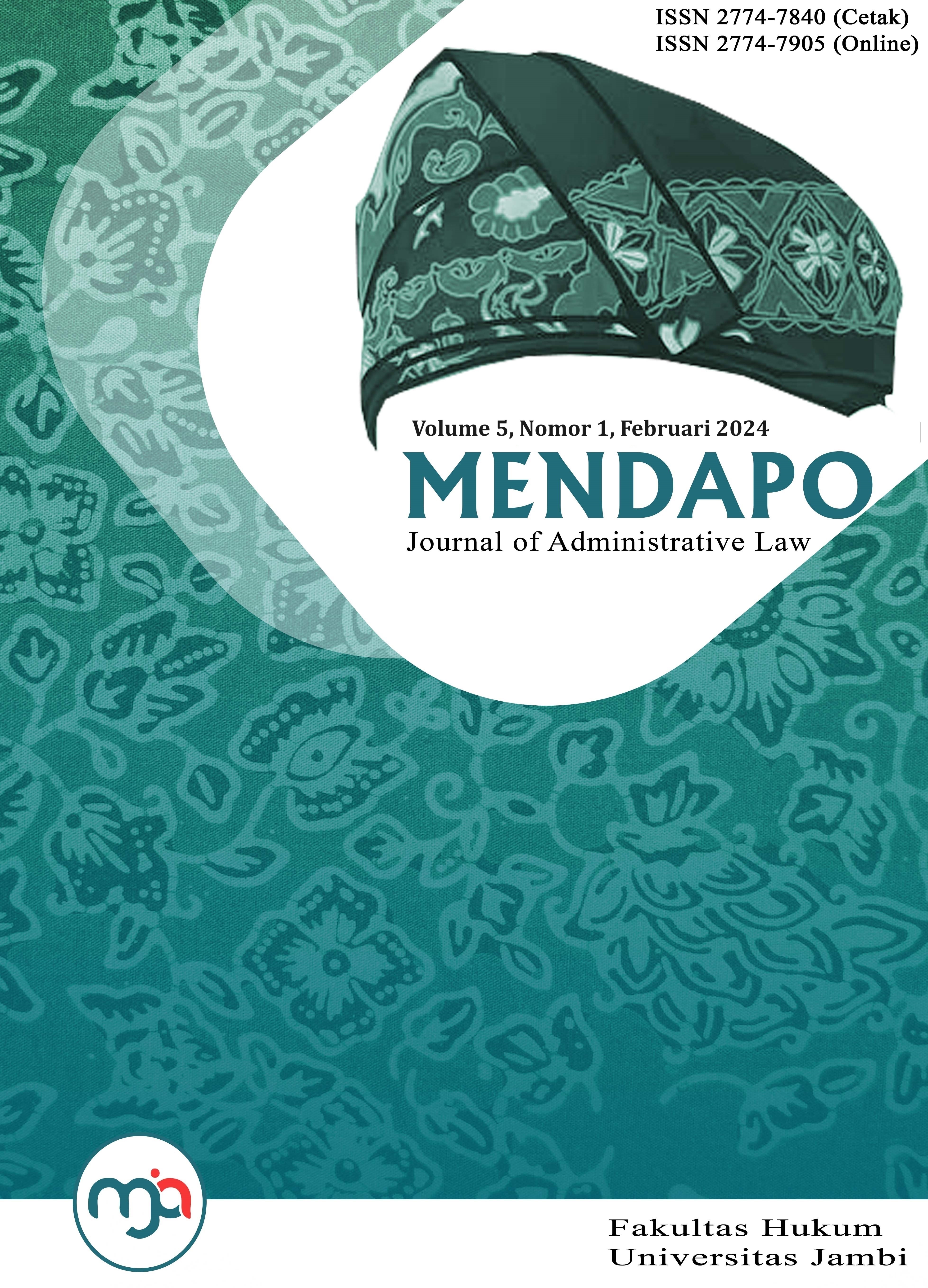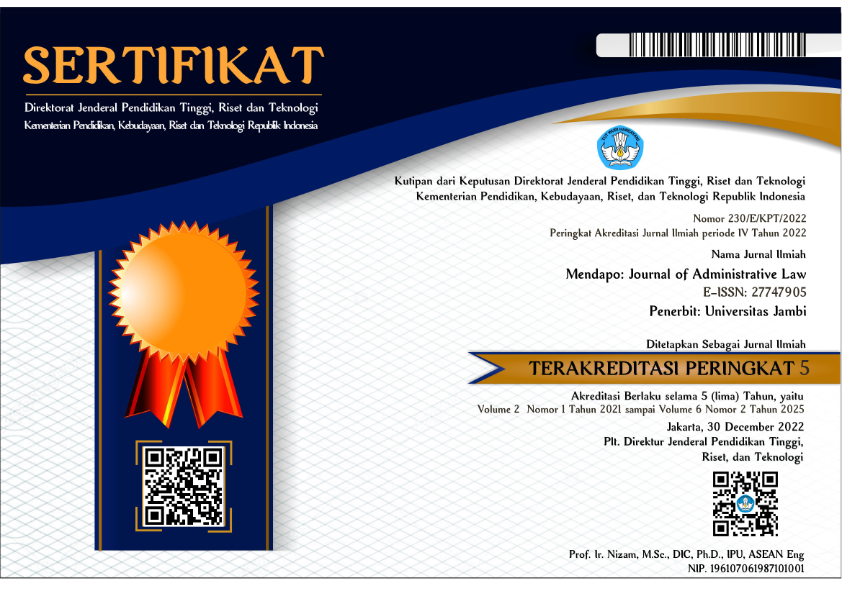OMNIBUS LAW ON CLIMATE CHANGE WITH DIMENSIONS OF JUSTICE FOR SOCIETY AND THE ENVIRONMENT
OMNIBUSLAW UNDANG-UNDANG PERUBAHAN IKLIM BERDIMENSI KEADILAN BAGI MASYARAKAT DAN LINGKUNGAN
DOI:
https://doi.org/10.22437/mendapo.v5i1.29873Keywords:
Omnibus Law, Perubahan Iklim, Keadilan, Lingkungan, ReformulasiAbstract
This research aimed to find out the urgency and construction of climate change legal reformulation in a sustainable and justice manner. Political legislation related to climate change currently manifests mainly through implementation regulations or even through policy products with less legal standing and binding force than if it is regulated in a law. The method used is normative legal research with a regulatory and conceptual approach. The results show that reformulation is required considering that climate change control efforts have not been effective. The environmental organisations state that various regions are still affected by climate change, experiencing deforestation and depending on the exploitation of natural resources. For these reasons, a new formulation of climate change regulation that ensures justice is to establish an omnibus law on Climate Change. This idea is new, yet still in line with the results of previous studies and research regarding the lack of climate change regulation that is still dispersed in many regulations and/or policies. The omnibus law on climate change is expected to be an instrument of climate change control that has dimensions of justice for society and the environment.
Downloads
References
Jurnal
Ruysschaert D, Hufty M. Building an effective coalition to improve forest policy: Lessons from the coastal Tripa peat swamp rainforest, Sumatra, Indonesia. Land Use Policy.
Widyatmanti W, Minasny B, Awanda D, Umarhadi DA, Fatma ZSN, Mahendra WK, et al. Codification to secure Indonesian peatlands: From policy to practices as revealed by remote sensing analysis. Soil Security.
Ahmed I, Ayeb-Karlsson S, van der Geest K, Huq S, Jordan JC. Climate change, environmental stress and loss of livelihoods can push people towards illegal activities: a case study from coastal Bangladesh. Climate and Development [Internet]. 2019;11(10):907–17. Available from: https://www.scopus.com/inward/record.uri?eid=2-s2.0-85062485530&doi=10.1080%2F17565529.2019.1586638&partnerID=40&md5=87d92996199f5b8babe48c90dd5ff7f8
Wolff NH, Zeppetello LRV, Parsons LA, Aggraeni I, Battisti DS, Ebi KL, et al. The effect of deforestation and climate change on all-cause mortality and unsafe work conditions due to heat exposure in Berau, Indonesia: a modelling study. The Lancet Planetary Health. 2021 Dec 1;5(12):e882–92.
Leijten F, Sim S, King H, Verburg PH. Local deforestation spillovers induced by forest moratoria: Evidence from Indonesia. Land Use Policy.
Reckien D, Creutzig F, Fernandez B, Lwasa S, Tovar-Restrepo M, Mcevoy D, et al. Climate change, equity and the Sustainable Development Goals: an urban perspective. Environment and Urbanization [Internet]. 2017;29(1):159–82. Available from: https://www.scopus.com/inward/record.uri?eid=2-s2.0-85019035377&doi=10.1177%2F0956247816677778&partnerID=40&md5=aed3055ba22d91df52079625bae69df4
Shen Y, Su Z-W, Malik MY, Umar M, Khan Z, Khan M. Does green investment, financial development and natural resources rent limit carbon emissions? A provincial panel analysis of China. Science of the Total Environment [Internet]. 2021;755. Available from: https://www.scopus.com/inward/record.uri?eid=2-s2.0-85092311217&doi=10.1016%2Fj.scitotenv.2020.142538&partnerID=40&md5=6fb4167e563a2431121b2a66c7990405
Muhamad GM, Heshmati A, Khayyat NT. How to reduce the degree of dependency on natural resources ? ☆. Resources Policy [Internet]. 2021;72(March):102047. Available from: https://doi.org/10.1016/j.resourpol.2021.102047
Kamil N, Bush SR, Gupta A. Does climate transparency enhance the reflexive capacity of state actors to improve mitigation performance? The case of Indonesia. Earth System Governance. 2021 Sep 1;9.
Lesutis G. Scenes of subjection: Extractive frontiers, symbolic violence, dispossession. Geoforum [Internet]. 2023;(September 2021):103681. Available from: https://doi.org/10.1016/j.geoforum.2023.103681
Spiegel SJ. Climate injustice, criminalisation of land protection and anti-colonial solidarity: Courtroom ethnography in an age of fossil fuel violence. Political Geography [Internet]. 2021;84:102298. Available from: https://doi.org/10.1016/j.polgeo.2020.102298
Arifah, Salman D, Yassi A, Demmallino EB. Livelihood vulnerability of smallholder farmers to climate change: A comparative analysis based on irrigation access in South Sulawesi, Indonesia. Regional Sustainability. 2022 Sep 1;3(3):244–53.
Chakrabarti A. Deforestation and infant mortality: Evidence from Indonesia. Economics and Human Biology.
Andreucci D, Zografos C. Between improvement and sacrifice : Othering and the ( bio ) political ecology of climate change. Political Geography [Internet]. 2022;92(September 2021):102512. Available from: https://doi.org/10.1016/j.polgeo.2021.102512
Canterbury DC. Extractivism and neoextractivism. Neoextractivism and Capitalist Development. 2018;53–76.
Mignamissi D, Malah Kuete YF. Resource rents and happiness on a global perspective: The resource curse revisited. Resources Policy.
Ekawati S, Subarudi, Budiningsih K, Sari GK, Muttaqin MZ. Policies affecting the implementation of REDD+ in Indonesia (cases in Papua, Riau and Central Kalimantan). Forest Policy and Economics [Internet]. 2019;108(May):101939. Available from: https://doi.org/10.1016/j.forpol.2019.05.025
Resosudarmo IAP, Tacconi L, Sloan S, Hamdani FAU, Subarudi, Alviya I, et al. Indonesia’s land reform: Implications for local livelihoods and climate change. Forest Policy and Economics.
Pramudya FS, Bong L, Rolling E, Awirya AA, Gunawan AAS. Forest loss analysis and calculation with geospatial artificial intelligence: A case study of papua province. Procedia Computer Science. 2023;216:346–55.
Spencer KL, Deere NJ, Aini M, Avriandy R, Campbell-Smith G, Cheyne SM, et al. Implications of large-scale infrastructure development for biodiversity in Indonesian Borneo. Science of the Total Environment.
Farhan F, Hoebink P. Can campaigns save forests? Critical reflections from the Tripa campaign, Aceh, Indonesia. Forest Policy and Economics [Internet]. 2019;105(April):17–27. Available from: https://doi.org/10.1016/j.forpol.
Indonesia FW. ANGKA DEFORESTASI SEBAGAI “ALARM†MEMBURUKNYA HUTAN INDONESIA [Internet]. Available from: https://fwi.or.id/wp-content/uploads/2019/10/FS_Deforestasi_FWI_small.pdf
Yamamoto Y, Shigetomi Y, Ishimura Y, Hattori M. Forest change and agricultural productivity: Evidence from Indonesia. World Development [Internet]. 2019;114:196–207. Available from: https://doi.org/10.1016/j.worlddev.
Obydenkova A V, Salahodjaev R. Climate change policies: The role of democracy and social cognitive capital. Environmental Research.
Jakob M, Flachsland C, Christoph J, Urpelainen J. Energy Research & Social Science Actors , objectives , context : A framework of the political economy of energy and climate policy applied to India , Indonesia , and Vietnam. Energy Research & Social Science [Internet]. 2020;70(September):101775. Available from: https://doi.org/10.1016/j.erss.
Ditemukan pada tahun 1896 oleh ahli kima Swedia, Svante Arrhenius, yang menyimpulkan bahwa pembakaran batu bara pada skala industri akan meningkatkan efek rumah kaca yang alami. https://www.bbc.com/indonesia/laporan_khusus/2009/11/091123_sejarahperubahan
Hannah Ritchie, Pablo Rosado and Max Roser (2020) - "Greenhouse gas emissions". Published online at OurWorldInData.org. Retrieved from: 'https://ourworldindata.org/greenhouse-gas-emissions' [Online Resource]
Sejarah Dunia Memerangi Perubahan Iklim", https://www.cnnindonesia.com/internasional/20151128130323-134-94617/sejarah-dunia-memerangi-perubahan-iklim.
United Nations – Convention on Biological Diversity and COP15â€, Adeline Lerambert, diakses pada 15 Oktober 2023, https://wellbeingintl.org/united-nations-convention-on-biological-diversity/?gclid=Cj0KCQjwm66pBhDQARIsALIR2zCNgK1m63Pmj5rizgtfXjUZsT6Xj2M0J4eb-NXch5K-_jZe5M3B-ygaArLLEALw_wcB
Pada 2020, Indonesia merupakan negara pengekspor batubara terbesar di dunia, Yanto, Determinan Ekspor Batubara Indonesia, Prosiding Seminar Nasional Seminar Akademik Tahunan Ilmu Ekonomi dan Studi Pembangunan, Vol 5, 2022, https://feb.untan.ac.id/wp-content/uploads/2023/06/18.pdf;
Sejarah! Ekspor Batu Bara RI ke Uni Eropa Melonjak 1.300%, Maesaroh, https://www.cnbcindonesia.com/market/20230119051620-17-406618/sejarah-ekspor-batu-bara-ri-ke-uni-eropa-melonjak-1300
Hannah Ritchie, Pablo Rosado and Max Roser (2020) - "Greenhouse gas emissions". Published online at OurWorldInData.org. Retrieved from: 'https://ourworldindata.org/greenhouse-gas-emissions' [Online Resource]
https://www.kaltimprov.go.id/berita/kaltim-terima-rp313-miliar-dana-karbon
Razi, F.M, Dampak Aktivitas Pertambangan Batubara Terhadap Lingkungan dan Masyarakat Kalimantan Timur, Marwah Hukum, Vol. 1 No. 1.
Belinda Putri Herawati and Yohanes Suwanto, “Pembentukan Peraturan Perundang-Undangan Yang Baik Bagi Indonesia,†Jurnal Demokrasi Dan Ketahanan Nasional | 1, no. 2 (2022): 355–62.
E-journal Universitas Asahan, “Jurnal Dialog: Vol/Num: VII/I, September 2018 Terindeks: Open Journal System (OJS)/Google Scholar ISSN: 2406-9401,†no.
Saifudin Saifudin, “Partisipasi Masyarakat Dalam Pembentukan Undang-Undang,†Jurnal Hukum IUS QUIA IUSTUM 10, no. 23 (2003): 1–27, https://doi.org/10.20885/iustum.vol10.iss23.art1.
Ferry Irawan Febriansyah, “Konsep Pembentukan Peraturan Perundang-Undangan Di Indonesia,†Perspektif 21, no. 3 (2016): 220, https://doi.org/10.30742/perspektif.v21i3.586.
Luthvi Febryka Nola, “Penerapan Omnibus Law Dalam Hukum Ketenagakerjaan Di Indonesia Penerapan Omnibus Law Dalam Hukum Ketenagakerjaan Di Indonesia,†Kajian 25, no. 3 (2020): 217–29, https://www.hukumonline.com/berita/baca/.
Suryati, Ramanata Disurya, and Layang Sardana, “Tinjauan Hukum Terhadap Omnibus Law Undang-Undang Cipta Kerja,†Simbur Cahaya 28, no. 2 (2021): 97–111, https://doi.org/10.28946/sc.v28i2.902.
Mustaring Mustaring, “The International Context of Indonesia’s Omnibus Law: A Bibliometric Review,†Jurnal Ilmiah Ilmu Administrasi Publik 12, no. 1 (2022): 123, https://doi.org/10.26858/jiap.v12i1.34759.
“THE 1 St PROCEEDING,†n.d.
Putera Astomo, “Pembentukan Undang-Undang Dalam Rangka Pembaharuan Hukum Nasional Di Era Demokrasi,†Jurnal Konstitusi 11, no. 3 (2016): 577, https://doi.org/10.31078/jk1139.
Muhammad Fadli, “Pembentukan Undang-Undang Yang Mengikuti Perkembangan Masyarakat,†Jurnal Legislasi Indonesia 15.
Noor Muhammad Aziz, “Urgensi Penelitian Dan Pengkajian Hukum Dalam Pembentukan Peraturan Perundang-Undangan,†Jurnal Rechts Vinding: Media Pembinaan Hukum Nasional 1, no. 1 (2012): 17, https://doi.org/10.33331/rechtsvinding.v1i1.104.
Buku
Teknik pengumpulan bahan hukum dengan metode library research dilakukan dengan cara mengumpulkan berbagai literatur (kepustakaan), baik berupa buku-buku, jurnal ilmiah, media massa, dan internet serta referensi lain yang relevan guna menjawab berbagai rumusan permasalahan. Baca Hasan, Iqbal, Pokok-Pokok Materi Metodologi Penelitian dan Aplikasinya (Jakata: Ghalia Indonesia, 2022), hlm.11.
Maria Farida Indarti, Omnibus Law, UU Sapu Jagat?, Harian Kompas, 4 Januari 2020.
Bayu Dwi Anggono, Omnibuslaw Sebagai Teknik Pembentukan Undang-Undang: Peluang Adopsi dan Tantangannya dalam Sistem Perundang-Undangan Indonesia, Jurnal RechtsVinding.
Internet
The World Bank. Indonesia Country Climate and Development Report. https://www.worldbank.org/en/country/indonesia/publication/indonesia-country-climate-and-development-report, April 28, 2023.
Cabinet Secretariat of The Republik of Indonesia. President Jokowi : Indonesia Commited https://setkab.go.id/en/president-jokowi-indonesia-commits-reducing-emission-by-29/. December 1, 2023. https://setkab.go.id/en/president-jokowi-indonesia-commits-reducing-emission-by-29/
BBC. Cek fakta pernyataan Jokowi di COP26, aktivis lingkungan peringatkan ‘bencana ekologi’ karena laju penggundulan hutan justru akan naik [Internet]. December, 2. 2021 [cited 2023 Mar 9]. Available from: https://www.bbc.com/indonesia/indonesia-59116948
Indonesia FW. Deforestasi Dari Masa ke Masa [Internet]. June, 24. 2020 [cited 2023 Mar 9]. Available from: https://fwi.or.id/deforestasi-indonesia-masa-ke-masa/
Merefleksi Dampak Pertambangan Batu Bara di Kaltim, Masalah Dana Bagi Hasil, hingga Data yang Tidak Transparan; Kaltimpost.com https://kaltimpost.jawapos.com/utama/03/06/2022/merefleksi-dampak-pertambangan-batu-bara-di-kaltim-masalah-dana-bagi-hasil-hingga-data-yang-tidak-transparan, diakses pada 21 Mei 2023
Peraturan perundang-undangan
Vide Konsideran huruf b Undang-Undang Nomor 13 Tahun 2022 tentang Perubahan Kedua atas Undang-Undang Nomor 12 Tahun 2011 tentang Pembentukan Peraturan Perundang-Undangan.
Putusan Mahkamah Konstitusi Republik Indonesia Nomor 91/PUU-XVIII/2020, hlm. 151-152.
Ketetapan sebagaimana dimaksud adalah Ketetapan MPR Nomor V/MPR/1973 tentang Peninjauan Kembali Produk-Produk Hukum yang Berupa Ketetapan-Ketetapan MPRS RI yang ditetapkan pada 22 Maret 1973. Ketetapan a quo dapat dipahami sebagai bentuk implementasi metode omnibus karena meninjau berbagai Ketetapan MPRS yang diberlakukan sejak tahun 1960 menjadi beberapa kelompok, baik itu dicabut, telah terakomodir dalam GBHN, masih berlaku dan perlu penyempurnaan, telah dilaksanakan, dan belum terakomodir materi muatannya dalam GBHN.
Ketetapan sebagaimana dimaksud adalah Ketetapan MPR Nomor 1/MPR/2003 tentang Peninjauan terhadap Materi dan Status Hukum Ketetapan MPRS dan Ketetapan MPR Tahun 1960 sampai dengan 2022. Pola yang digunakan adalah sama sebagaimana ketetapan MPR yang telah dijelaskan sebelumnya.
Pasal 5 undang-undang a quo menyebutkan bahwa dalam membentuk peraturan perundang-undangan harus dilakukan berdasarkan pada asas pembentukan perundang-undangan yang baik, yang meliputi: kejelasan tujuan, kelembagaan atau pejabat pembentuk yang tepat, kesesuaian antara jenis, hierarkim dan materi muatan, dapat dilaksanakan, kedayagunaan dan kehasilgunaan, kejelasan rumusan, dan keterbukaan.
Pasal 6 undang-undang a quo menyebutkan bahwa materi muatan peraturan perundang-undangan harus mencerminkan asas pengayoman, kemanusiaan, kebangsaan, kekeluargaan, kenusantaraan, bhinneka tunggal ika, keadilan, kesamanaan kedudukan dalam hukum dan pemerintahan, ketertiban dan kepastian hukum, dan/atau keseimbangan, keserasian, dan keselarasan.
Downloads
Published
How to Cite
Issue
Section
License
Copyright (c) 2024 Rahmawati Al Hidayah, Wiwik Harjanti, Harry Setya Nugraha, Haris Retno Susmiyati, Alfian Alfian

This work is licensed under a Creative Commons Attribution 4.0 International License.







